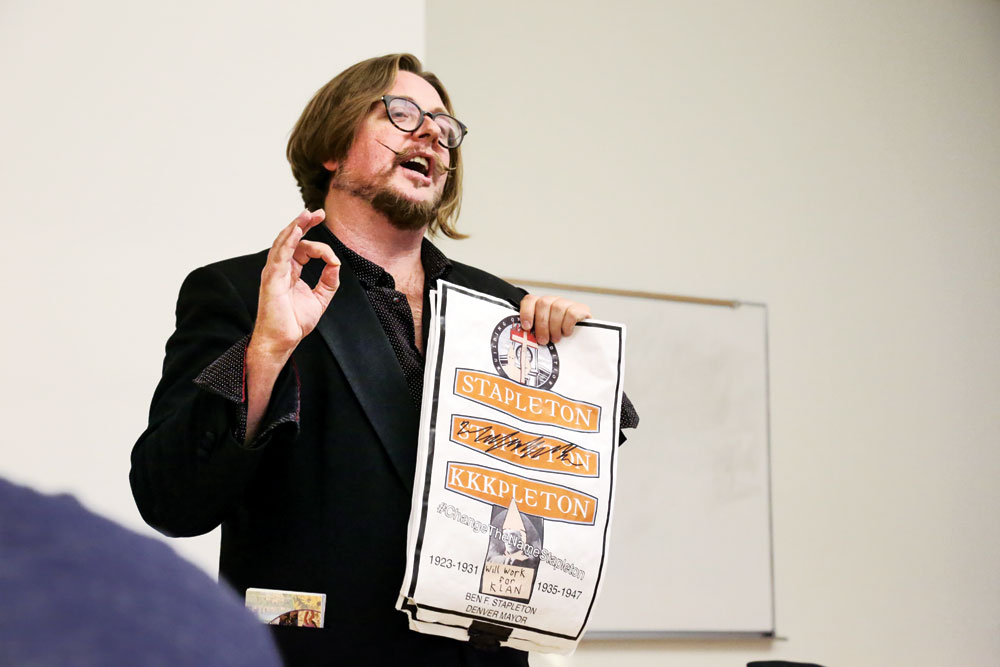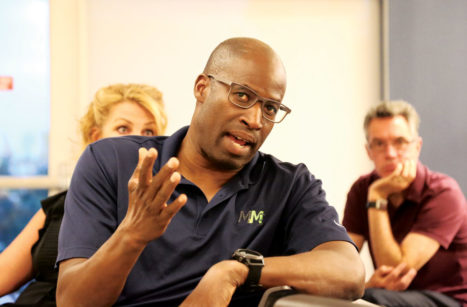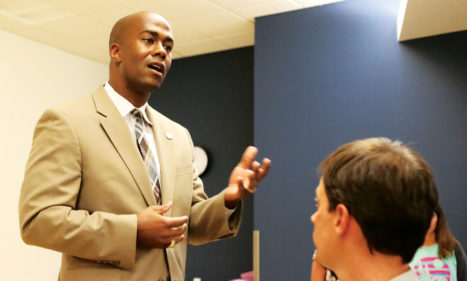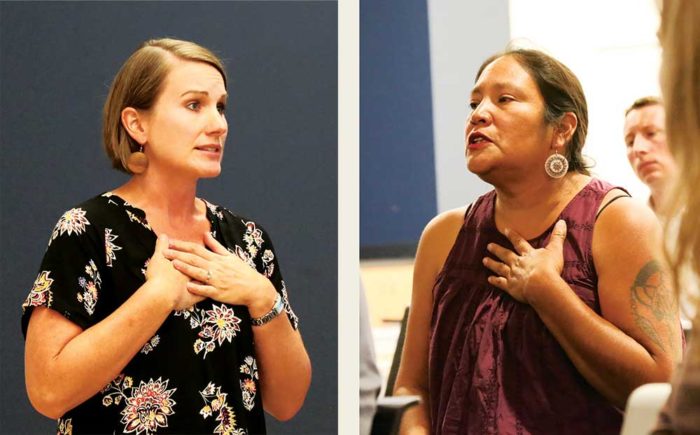
“When I hear Stapleton, it hits my ear…with a thud. So, I’m not going to be referring to it as Stapleton. I’m now going to call it KKKpleton because that’s what people hear when they hear that name.”
-Aaron Johnson
“KKKpleton” is the name Denver activist Aaron Johnson prefers to use when he talks about the neighborhood others call Stapleton. Johnson, who also goes by the moniker Ukulele Loki, spoke at the August 15 Stapleton United Neighbors (S.U.N.) meeting in a renewed effort to change the name of Stapleton.

Park Hill resident Vincent Bowen attended the meeting about the Stapleton name and expressed his opinion that it should be changed.
Inspired by recent efforts to remove historical symbols of racism in Charlottesville and other Southern cities, Johnson drew a parallel to Denver Mayor Benjamin F. Stapleton. Stapleton joined the Klan in the 1920s, when the KKK was a powerful business and political force in Denver, in order to get elected to his first term. The KKK burned crosses on South Table Mountain in celebration.
“I invite you all to do something really bold and be a force for good,” continued Johnson. “It’s time we take the Stapleton name down.” Johnson suggested Justina Ford as a new name, inspired by the first African-American female doctor in Denver, who called Curtis Park home.
Johnson’s remarks drew applause from a number of Denver activists who attended the neighborhood meeting.
S.U.N. chair Amanda Allshouse strenuously objected to Johnson’s promotion of the KKKpleton designation, saying “Any tying of this community in any way to anything of that nature is incredibly offensive.” Pointing to the neighborhood’s response to the racist graffiti at Isabella Bird Community School last year and efforts by S.U.N. to address diversity issues, Allshouse reaffirmed the community’s ongoing commitment to inclusion.
Neighbors and visiting activists also discussed the challenges of changing the name, which include the cost to small businesses, the fact that Stapleton is used as a locator but is not an official municipal designation, and the seeming lack of enthusiasm for a name change by the developer, Forest City. Many urged S.U.N. to take action to stop the glorification of white supremacy through continued use of the name.

“Right now you have people transitioning from homelessness, right next to million dollar homes. You have a huge LGBTQ community. How would the KKK feel about that? And that is welcomed, embraced and loved. We have taken a name that has a terrible history and look what it has become.” -Councilman
Chris Herndon
Councilmember Chris Herndon, who lives in and represents Stapleton, responded to the issue from both personal experience and as an elected representative.
“When I moved here, I was a single black man,” said Herndon, who described his rise from block captain to elected city councilmember. “So, the idea that this is KKKpleton … you can’t be more off base, in my personal opinion. I’m not bothered by the name Stapleton.”
Herndon urged understanding of the whole story, pointing out that Mayor Stapleton later renounced his KKK membership.
He also believes the community has the opportunity to reclaim the meaning of the name: “As you learn about the history of Stapleton, what has this community become?” asked Herndon. “Right now you have people transitioning from homelessness, right next to million-dollar homes. You have a huge LGBTQ community. How would the KKK feel about that? And that is welcomed, embraced and loved. We have taken a name that has a terrible history and look what it has become.”
As a councilmember, Herndon says he receives very little correspondence on the issue of the name, particularly compared to the volume he receives on crime and traffic. The conversations he’s had with people don’t coincide with what activists have characterized as “this overwhelming desire to change the name,” he said.
Lakota-Sioux activist Molly Ryan-Kills Enemy shared her experiences, including the pain she feels when she sees her own heritage dishonored across Denver. In response, Park Hill resident Vincent Bowen, who opposes the name, emphasized the importance of learning about the past as a way to empower people. Bowen suggested that the Stapleton community could lead the way in changing how people remember and honor historical figures. “Perhaps it’s a name change; perhaps it’s not,” he said.

Molly Ryan–Kills Enemy (right), a member of the Lakota Sioux tribe, drove across town to join the S.U.N. meeting. She introduced herself as an outsider, but S.U.N. chair, Amanda Allshouse (left), welcomed her input, saying, “I wish you hadn’t introduced yourself as an outsider.” Ryan–Kills Enemy reminded the rapt audience of the Native Peoples’ history in the region and that use of the land should respect that history.
For example, in a recent interview with Ryan Warner on Colorado Matters, Colorado State Historian Patty Limerick addressed the issue, saying “In order to get elected, [Stapleton] took up with the Klan. In later phases of his life he regretted that and spoke differently about the Klan. What an opportunity for all of us to consider that example.” Limerick suggested instituting a Stapleton Reflection Day, where the community comes together to discuss the “cautionary tale” of Mayor Stapleton and his “deal with the Devil.” “How do we draw upon his experience to make our choices wiser?” asked Limerick.
Many meeting attendees supported further discussion about the name change.
According to a survey conducted by S.U.N. this spring, however, the majority of Stapleton residents (54 percent) are not interested in participating in further discussion about the name, with 16 percent wanting to participate in further discussion, while the remainder are unsure or have no opinion. Of survey respondents, 51.7 percent are completely or somewhat comfortable with the name, with 9.6 percent completely uncomfortable. Allshouse noted that those percentages were similar when looking by race.
Some in the audience criticized the survey for being poorly publicized, although, according to Allshouse, it was sent out through direct email to all MCA members, posted on social media, and notice published in the Front Porch. There are approximately 7,000 households in Stapleton, and 1,005 people responded to the survey.
Activists plan to circulate petitions for a name change and are discussing engaging national media in their efforts. The issue is likely to arise again at the September 19 S.U.N. meeting.
SUN Name Change 2 from Steve Larson on Vimeo.




Ben Stapleton “renounced” the KKK only after he had what he wanted and when it was politically expedient to do so (i.e., the KKK became less popular). In seeking power, he upheld the structure of white supremacy– a legacy that is still playing out today in our city and country. Stapleton never truly used his platform to make amends in the community or to champion civil rights. There is little evidence of true redemption and no honor in his legacy. Change the name!
Letter to the editor from Bert Singleton:
Regarding the effort to change the Stapleton name; if Aaron Johnson wants to influence Stapleton residents he might want to reconsider starting out with a childish insult, referring to our community as KKKpleton. Sadly, he seems more interested in inflammatory statements then working towards consensus on the issue of what to call the community. Stapleton did join the KKK as a young man but later renounced the organization. That must have taken a great deal of courage as the KKK was a powerful political force and I am sure they did not take kindly to his effort to distance himself from them.
Stapleton should be praised for making that change and that should be the focus of this discussion – how people can change for the better. Another example is Supreme Court Justice Hugo Black who also joined the KKK in his youth and later renounced the organization – another act of courage, especially in his home state of Alabama. Justice Black became a champion of civil rights while serving on the Supreme Court for over 30 years and is credited with being a major force in the battle against racism and segregation. Is Mr. Johnson ready to also throw Justice Black, along with Ben Stapleton, on the trash heap of history or can he recognize the powerful healing force of redemption?
Letter to the editor from Paul Bareis:
Mayor Stapleton was a member of the KKK, a hate group. Charlottesville was a startling wake up call, reminding us what hate groups are all about: subjugating others, violence and destroying that which is good.
This place was admirably transformed by Forest City from a functional international airport, but also with its resultant contaminated soils and compromised ecosystems, into an earth-friendly, walkable community of interconnected neighborhoods. Forest City positively changed this place. It (we?) also need/s to change Stapleton’s name to reflect that positive transformation.
Mayor Stapleton even lied about his KKK membership in order “to appease his Jewish and Catholic supporters.” (https://en.wikipedia.org/wiki/Benjamin_F._Stapleton) I’m so tired of politicians who lie out of political expediency! One can see how such ‘traditions’ get started and then become acceptable even in this modern (progressive?) age. A democracy is essentially a contract of trust between the people and the politicians we elect. Stapleton violated that trust and it’s high time we say “No more!”, to this lack of moral integrity.
And let’s make a HUGE deal about making a name change; hold a naming contest of sorts with the ultimate goal of choosing a name that accurately reflects this model community. This will send a message loud and clear to those five hate groups that currently operate in and around Denver, to the KKK or to other white supremacist groups that might want to hold rallies or conventions in our community, that Denver will not be another Charlottesville. In addition, we will not turn back the clock and become a haven for the KKK like Denver was in the ‘20s and ‘30s. Maybe, just maybe, by taking such a proactive stance, we can prevent the needless death of another person like Heather D. Heyer. We cannot allow the sacrifice of our children to such hate groups.